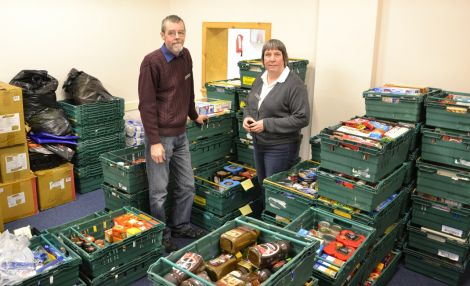News / Hunger and poverty amid economic boom
WHENEVER Angela Nunn of the Salvation Army hands out hot water bottles, blankets and duvets to some of Shetland’s most needy residents, she has mixed feelings: “They need to be able to afford to heat their home properly.”
It is a deeply uncomfortable truth that, in a wealthy community with exceptionally low unemployment, demand for food parcels and other assistance exists at all.
Retired Anderson High School geography teacher David Grieve recently joined the Salvation Army as a community assistant. It has been an eye-opener for him: “I wasn’t aware of the poverty situation we have in Shetland. People just assume poverty isn’t there – it’s hidden.”
People still ask Nunn from time to time: “Do you send the food parcels to Aberdeen?”
While the proportion of folk affected is relatively small compared to many parts of the country, demand is not letting up. Only a tenth of those accessing help are returning clients. Many are on low pay, struggling to heat their home and feed their family.
November saw 35 relief packages distributed – a 25 per cent increase on the corresponding month in 2013. In the first half of December, 16 food parcels were dished out – up by a third on last year.
Nunn says the primary cause is changes to the UK welfare system. Those who lose benefits, often temporarily, as a result of government sanctions are falling victim to a “shoot now and ask questions later” approach.
“It’s like pulling the carpet out from underneath someone’s feet,” she says, and the proportion of successful appeals suggests a “hasty and ill thought out” system.
‘Every person is unique and precious’
Some examples frankly beggar belief. One islander had their benefits stripped earlier this year because a benefits assessor’s flight to Shetland was fogbound; they were marked down as having failed to attend an appointment.
Become a member of Shetland News
“We need a person-centred welfare system,” Nunn says. “Every person is unique and precious, and the system is the complete antithesis of that – you’re just a number.
“One benefit stops and it’s two weeks until they get another one. We always talk about the welfare state being a safety net – we are under there trying to catch people that are falling out.”
She says Northern Isles MP Alistair Carmichael, a member of the Tory-Lib Dem coalition cabinet, got “a bit of an ear-bashing” about the effects of sanctions when he visited the food bank last month.
Following the upsurge in political interest during the Scottish independence referendum campaign, Nunn feels people are “a lot more vocal, less willing to lie down and say nothing”.
She describes a “steep learning curve” during her three and a half years in the job. Sometimes she despairs at being left applying “sticking plasters on a massive, gaping wound”, but in the main her experiences “make me more determined”.
Shetlanders are “really generous when they know there’s a need”, and those at the Salvation Army’s North Road premises were “knee deep” in donations following the autumn harvest.
In conjunction with the British Red Cross a Christmas list of modest gifts for struggling families and elderly folk was placed in local shops on 20 November. The list was completed in less than 10 days – again demonstrating the community’s generosity, Grieve says.
We speak the day before Conservative peer Baroness Jenkin provoked widespread condemnation by claiming poor people “don’t know how to cook”.
Grieve points to a recent survey indicating two third of people want to eat more healthily, but 42 per cent feel they cannot afford to.
One client’s kitchen, he says, basically amounts to “a microwave and a cupboard”. Some can’t afford the electricity to switch on the oven and limit themselves to cooking in a single pot to keep energy bills down.
‘You just never know when you might need it’
Fifty two year old Dave Renwick, who moved to Shetland from north east England in 1975, had been working as a taxi driver until he encountered health problems. Taking insulin meant he lost his driving licence and his job – meaning he required food parcels for a time.
“If you’re on the dole, it’s very, very hard to survive,” he tells Shetland News. “You have to really work things out to make your money stretch that far.”
Renwick also gave something back. Rather than sitting around feeling depressed about being unemployed, he began helping out at the Salvation Army: cleaning, organising tins of food and making the tea.
“Angela runs herself absolutely ragged doing stuff for people less fortunate than herself,” he says.
“You just never know when you might need it. People lose a job for, I don’t know, medical reasons, an accident at work. You don’t get your wages and you’re really on a lot less money – you have to seek out this help if you’re entitled to it.”
Renwick feels some firms get away with “paying peanuts”. The minimum wage has not kept pace with inflation and the price of things like food has “absolutely rocketed” in recent years.
SIC convener Malcolm Bell sits on the board of the Citizens Advice Bureau (CAB), making him “well aware that whilst Shetland is superficially wealthy, there are significant instances of hardship which, amidst the ‘boom’, is all the more insidious”.
While welfare remains mostly reserved to Westminster, he hopes that following further devolution under the Smith Commission “some elements will be rolled out to local authorities”.
“The work of the Salvation Army, whilst regretfully necessary, is vital and important,” Bell says. “However, we must all work for the day such operations are totally unnecessary.”
‘Not immune from changes’
Local measures Nunn believes could make a difference include discounted bus tickets and leisure centre access for those least well off. The latter would enable them to take a warm shower as well as keep fit and healthy, she says.
The council’s housing manager Anita Jamieson points out that government winter fuel payments, which kick in when the temperature remains below a certain threshold for several days, take no account of wind chill.
With payments based on air temperature, the threshold is “rarely triggered here”, Jamieson says – meaning many islanders living in fuel poverty miss out on sorely-needed assistance.
Following his Salvation Army visit last month, Carmichael has arranged for regional Department for Work and Pensions manager John Dennison to visit Shetland and meet Nunn, CAB and others to “get to the bottom of any service improvements that could be made”.
He describes the example of sanctions being applied because the assessor couldn’t get to Shetland as “ridiculous”, and says he has regularly taken up cases on behalf of constituents.
While Tory Chancellor George Osborne has talked of making a further £12 billion of benefits cuts after the next election, Carmichael says the Lib Dems “take a different view – when it comes to continuing the job of paying down the deficit, we’re not prepared to do it all on the basis of welfare cuts”.
He supports “the concept” of a living wage, but believes it is a matter for companies rather than state legislation. But he thinks the government can use the tax system to help.
“If you raise the personal allowance [before workers start paying income tax] to about £12,500, that would take most people in a full time job on the minimum wage out of paying tax.”
As to the growing need for food parcels in Shetland, the MP says it shows “we’re not immune from the changes that happen and the pressures people are under across the whole of the country”.
“It’s not just people on benefits,” he says. “In the last 10-20 years, the extent to which we borrow money has grown enormously. There’s not the resilience in household budgets.
“Wages have been frozen in cash terms and there have been some very steep rises in commodities, energy in particular.”
‘Heartbreaking levels of inequality’
Campaigner Miriam Brett, from Bressay, works as a policy analyst for Common Weal – an organisation striving for a fairer and more equal Scotland.
She says the Conservatives, Labour and the Lib Dems are all “committed to continue austerity measures” – including “inhumane welfare reforms strategically set out to target the poorest and most vulnerable members of our society”.
Deeper cuts will only worsen things in a “chronically unequal” UK, Brett says, and she blames a low wage economy for the “rise in the working poor”.
“It is absurd that in such a vastly wealthy society such as Shetland, with a diverse economy and incredible resources, we have such heartbreaking levels of inequality, hunger and poverty.”
Become a member of Shetland News
Shetland News is asking its many readers to consider paying for membership to get additional features and services: -
- Remove non-local ads;
- Bookmark posts to read later;
- Exclusive curated weekly newsletter;
- Hide membership messages;
- Comments open for discussion.
If you appreciate what we do and feel strongly about impartial local journalism, then please become a member of Shetland News by either making a single payment, or setting up a monthly, quarterly or yearly subscription.






























































